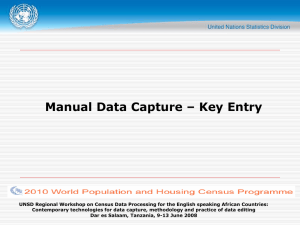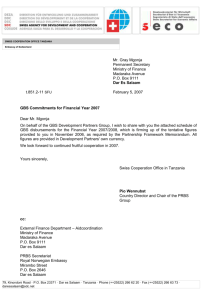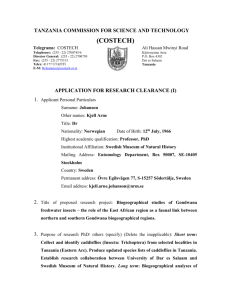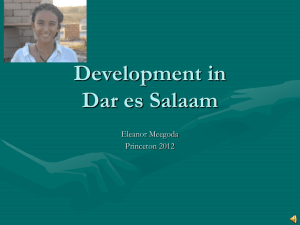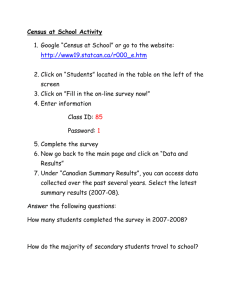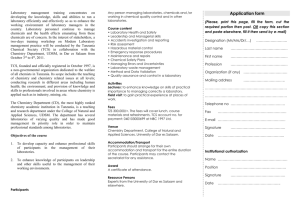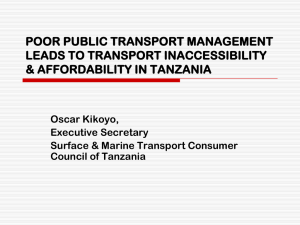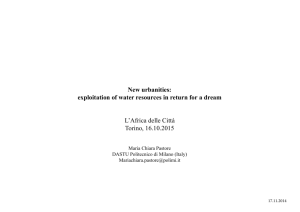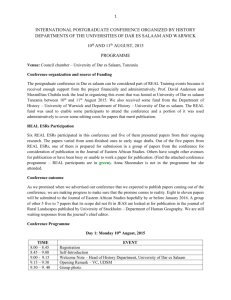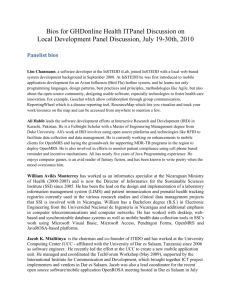1. Overview
advertisement
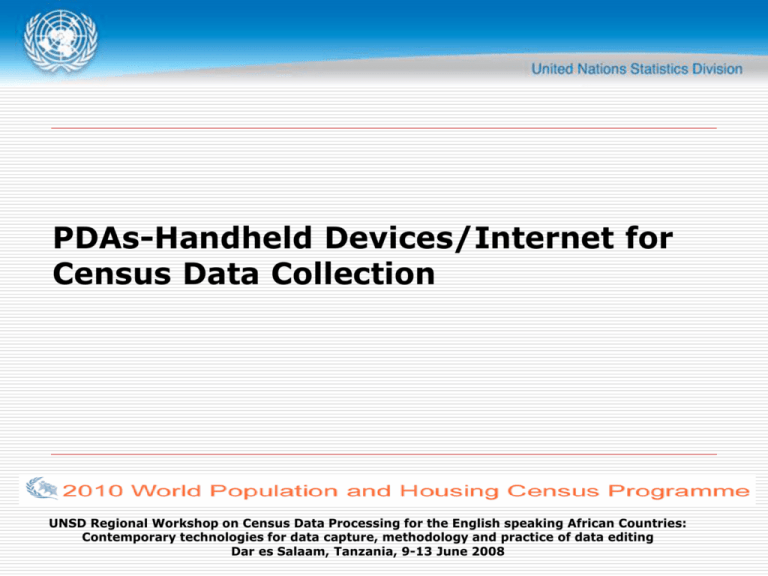
PDAs-Handheld Devices/Internet for Census Data Collection UNSD Regional Workshop on Census Data Processing for the English speaking African Countries: Contemporary technologies for data capture, methodology and practice of data editing Dar es Salaam, Tanzania, 9-13 June 2008 Overview of the Presentation Challenges with Paper-based Data Collection and Processing Moving to PDA/Handheld-based Data Collection and Processing PDAs: Key Features/Other Optional Features Internet-based Census Data Collection Benefits/Issues Recommendations - Conclusions UNSD Regional Workshop on Census Data Processing for the English speaking African Countries: Contemporary technologies for data capture, methodology and practice of data editing Dar es Salaam, Tanzania, 9-13 June 2008 Paper-based Data Collection Paper-and-Pencil Interviewing Handheld devices Paper-based Data Collection Self-administrated Questionnaire Internet UNSD Regional Workshop on Census Data Processing for the English speaking African Countries: Contemporary technologies for data capture, methodology and practice of data editing Dar es Salaam, Tanzania, 9-13 June 2008 Challenges with Paper-based Data Collection/ Processing Slow and time-consuming Re-keying information is inefficient and increases chance of error Paper-based forms increase chance of error Submitting multiple forms for a single process Cannot capture value-added data – GIS Data Integrity and Authenticity UNSD Regional Workshop on Census Data Processing for the English speaking African Countries: Contemporary technologies for data capture, methodology and practice of data editing Dar es Salaam, Tanzania, 9-13 June 2008 PDA and Handheld Computer Personal digital assistant: “A personal digital assistant (PDA) is a handheld computer, also known as small or palmtop computers.” (Wikipedia) PDA vs Handheld computer: Handheld computer offers more features than a PDA (larger than a PDA; smaller than a Laptop!) Used interchangeably UNSD Regional Workshop on Census Data Processing for the English speaking African Countries: Contemporary technologies for data capture, methodology and practice of data editing Dar es Salaam, Tanzania, 9-13 June 2008 Paper-based Approach vs PDA’s Approach Data Collection Paperbased Approach Manual Data Entry -Key entry/computer-assisted - OMR/OCR/ICR Data Coding/Editing Manual Computer-assisted Data Coding/Editing Data Collection/Entry/Coding/Editing PDA ‘s Approach Automated/built-in (partial) Manual Computer-assisted UNSD Regional Workshop on Census Data Processing for the English speaking African Countries: Contemporary technologies for data capture, methodology and practice of data editing Dar es Salaam, Tanzania, 9-13 June 2008 PDA: Way of Functioning Simultaneously data entering and data coding Possibility to enter data in two ways: with selection from the offered list of answers (or from classification in hierarchical order ) or with typing a text The next question could not be answered if the current one is not answered To have report of enumerated units (cumulative) in each moment To measure the time needed for enumeration of each separate enumeration unit UNSD Regional Workshop on Census Data Processing for the English speaking African Countries: Contemporary technologies for data capture, methodology and practice of data editing Dar es Salaam, Tanzania, 9-13 June 2008 PDAs - Key Features Works like a “Pocket Computer” Processor, RAM, ROM, Operating System Applications can we loaded on the device Device has processing power Increases Productivity “on the move” Data can be collected in digital format in the field Data can be directly uploaded into the server UNSD Regional Workshop on Census Data Processing for the English speaking African Countries: Contemporary technologies for data capture, methodology and practice of data editing Dar es Salaam, Tanzania, 9-13 June 2008 Cont… Connectivity Options Data connectivity using GPRS /CDMA Data Connectivity options using Wi-Fi (Wireless) Data can be transferred by “syncing” with Computer: wired connectivity via USB cable (PDAs connect to computer) Enhanced data storage Increase storage capacity through add on SD cards Optional features Camera, Biometric, GPS, Add on Smart Card reader etc UNSD Regional Workshop on Census Data Processing for the English speaking African Countries: Contemporary technologies for data capture, methodology and practice of data editing Dar es Salaam, Tanzania, 9-13 June 2008 Two Types of Handheld devices: Pen Based Pocket PC’s o Stylus based input o Data transfer through “sync” Converged Pocket PC with Connectivity o Connected via GPRS / CDMA o Options of Camera, GPS UNSD Regional Workshop on Census Data Processing for the English speaking African Countries: Contemporary technologies for data capture, methodology and practice of data editing Dar es Salaam, Tanzania, 9-13 June 2008 Three forms of data transfer (from HP) Sync and transfer data Collect data in the field Using PDA with data sync option Option 1 Option 2 Using PDA inbuilt GPRS capability Collect data in the field Send data via Inbuilt GPRS Option 3 Collect data in the field Send data via phone Using PDA in connection with Bluetooth Phone / connected cable UNSD Regional Workshop on Census Data Processing for the English speaking African Countries: Contemporary technologies for data capture, methodology and practice of data editing Dar es Salaam, Tanzania, 9-13 June 2008 Selection Criteria: Data Input Method Memory capacity Stylus, On device keyboard, Off Device Keyboard RAM:64-128 MB ROM: Inbuilt ROM, Additional ROM via SD Card Connectivity Options Sync through computer, In-built GPRS/CDMA, Wi-Fi, Bluetooth Ruggedness Regional Language Support Arabic, English plus additional languages Other Options GPS, Camera, etc. UNSD Regional Workshop on Census Data Processing for the English speaking African Countries: Contemporary technologies for data capture, methodology and practice of data editing Dar es Salaam, Tanzania, 9-13 June 2008 Other Decision Making Criteria: Real time data upload Vs Batch data upload Recurring costs for data connectivity Ease of data entry/Ease of holding device in one hand Battery Life / Battery Charging Options UNSD Regional Workshop on Census Data Processing for the English speaking African Countries: Contemporary technologies for data capture, methodology and practice of data editing Dar es Salaam, Tanzania, 9-13 June 2008 Managing devices in the field: Some Considerations How do we manage the devices in the field? Data security? Device security? Application version on device? Troubleshooting on device? UNSD Regional Workshop on Census Data Processing for the English speaking African Countries: Contemporary technologies for data capture, methodology and practice of data editing Dar es Salaam, Tanzania, 9-13 June 2008 Measures for data protection Ensure protection from: Loosing of already entered records Ex-post data correction in entered records Unauthorized using of data Measures: Biometric Security Security for Wireless and GPRS Encrypting Data Make it “solid” (rugged?) Make it “ugly”! UNSD Regional Workshop on Census Data Processing for the English speaking African Countries: Contemporary technologies for data capture, methodology and practice of data editing Dar es Salaam, Tanzania, 9-13 June 2008 Optional Features The device can be enabled with GPS to: geo-reference units visited (urban and rural) track location of data entry Positioning and guidance of the enumerator With Cellular, camera and OS applications UNSD Regional Workshop on Census Data Processing for the English speaking African Countries: Contemporary technologies for data capture, methodology and practice of data editing Dar es Salaam, Tanzania, 9-13 June 2008 PDAs Costs Pocket PCs: $300-$1200 Cost dependent on User Interface Upgrading Economy of scale Deployment issues UNSD Regional Workshop on Census Data Processing for the English speaking African Countries: Contemporary technologies for data capture, methodology and practice of data editing Dar es Salaam, Tanzania, 9-13 June 2008 Summary of Key Features Integrated field platforms with GPS, cellular, camera and OS applications Real-time task management from office Manage field time, expenses, etc. Geographical and map processing Data synchronization and management Secure applications, procedures and protocols Ability to encrypt data for secure transmission UNSD Regional Workshop on Census Data Processing for the English speaking African Countries: Contemporary technologies for data capture, methodology and practice of data editing Dar es Salaam, Tanzania, 9-13 June 2008 Self-administrated Questionnaire Paper-and-Pencil Interviewing Handheld devices Self-administrated Questionnaire Internet Paper-based Data Collection UNSD Regional Workshop on Census Data Processing for the English speaking African Countries: Contemporary technologies for data capture, methodology and practice of data editing Dar es Salaam, Tanzania, 9-13 June 2008 Internet-based Census Data Collection (eCensus) Why? Requested by the population (e.g. France) E-Government Policy (e.g. Canada) Some benefits Accurate and timely data collection Processing time reduced Rapid availability of clean data for statistical analysis Enhanced analytics Reuse and consumption by multiple Departments Enhanced Efficiency: eliminating layers, reducing staff and costs UNSD Regional Workshop on Census Data Processing for the English speaking African Countries: Contemporary technologies for data capture, methodology and practice of data editing Dar es Salaam, Tanzania, 9-13 June 2008 Example: Canada Experience Government On-Line (GOL) initiative Census 2006: 73% Mail-out via Canada Post Development and integration of Internet application and processing was outsourced to private sector Target: 20% of initial response from the Internet UNSD Regional Workshop on Census Data Processing for the English speaking African Countries: Contemporary technologies for data capture, methodology and practice of data editing Dar es Salaam, Tanzania, 9-13 June 2008 Example: European Census Organization Pilot for 2011 The pilot includes two key aspects: •eCensus (census online) and •Handheld devices. They want to equip census takers with hand-held devices to update addresses nationwide, and for non-response follow up or to input information during a canvass of homes whose residents fail to submit paper census surveys. From “RGI Conference on Technology Options”, IBM UNSD Regional Workshop on Census Data Processing for the English speaking African Countries: Contemporary technologies for data capture, methodology and practice of data editing Dar es Salaam, Tanzania, 9-13 June 2008 Recommendations for the use of PDAs Think Integration – People, Process, Technology Build Partnership with: Application development partner Device Manufacturer Connectivity provider Capacity building supporter Nodal Agency: Operationalize the whole process UNSD Regional Workshop on Census Data Processing for the English speaking African Countries: Contemporary technologies for data capture, methodology and practice of data editing Dar es Salaam, Tanzania, 9-13 June 2008 Summary-Conclusions 1. The qualitative as well as quantitative benefits of handheld devices have been proven in field in many countries (Australia, Canada, Brazil, Malaysia, New Zealand, etc…) 2. Various Options are available for selecting handheld devices 3. Clear identification of objective is required for selecting best device 4. Important to have extensive training prior to deployment 5. Post implementation support – technical as well as hardware support ensures project success UNSD Regional Workshop on Census Data Processing for the English speaking African Countries: Contemporary technologies for data capture, methodology and practice of data editing Dar es Salaam, Tanzania, 9-13 June 2008 Thank You UNSD Regional Workshop on Census Data Processing for the English speaking African Countries: Contemporary technologies for data capture, methodology and practice of data editing Dar es Salaam, Tanzania, 9-13 June 2008
